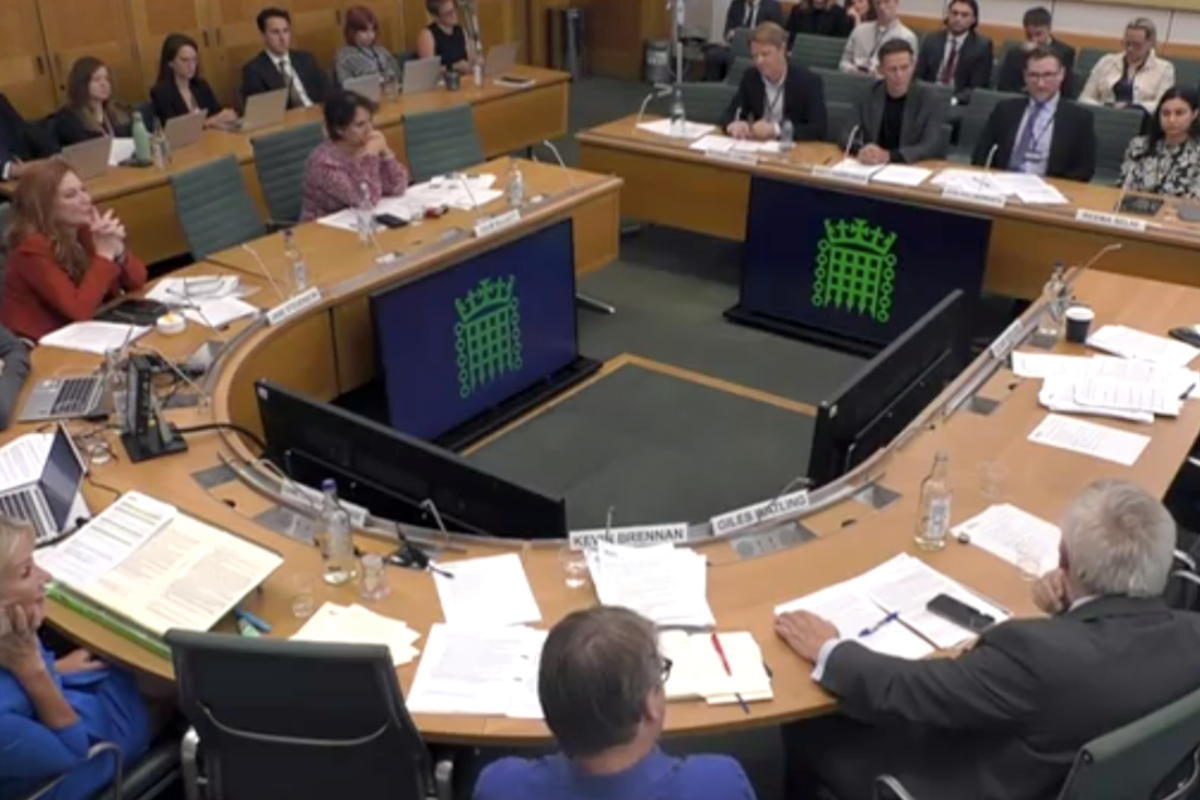
Sector leaders giving evidence to the Culture, Media and Sport Select Committee
Photo: Parliament TV
Renewed calls for freelance commissioner
Culture, Media and Sport Committee hears from sector leaders that more joined-up thinking is required to address precarity of creative freelancers.
Leaders from across the creative industries have told the Culture, Media and Sport (CMS) Committee that creatives, and in particular freelancers, are facing unsustainably low levels of pay.
The cross-party group of MPs held its first evidence session into an inquiry on creator remuneration this week (19 September).
When asked what was required to make freelance work in the creative industries less precarious, witnesses called for government to appoint a freelance commissioner to support the working lives and rights of freelancers.
READ MORE:
“Given the huge reliance of the sector on freelance workers – DCMS estimates 30%, I think it’s probably higher – we’ve asked for consideration of a freelance commissioner,” said Richard Combes, Head of Rights and Licensing and Deputy Chief Executive of Licensing and Collecting Society.
Combes explained a freelancer commissioner could “be a conduit between industry organisations and government” and “the centre of knowledge, expertise, trust and independence” on issues impacting freelancers including copyright, taxation, unusual income and work patterns, and pathways into the sector.
Committee member Labour MP Kevin Brennan also suggested a freelance commissioner could look at shared parental leave for freelancers.
Reema Selhi, Head of Policy and International at Design and Artists Copyright Society (DACS), agreed: “I think it would be a really necessary opportunity to tie in all the different issues freelancers experience,” she said.
“The creative industries sit between quite a few different departments and this would be an opportunity to have a singular voice and have that voice represented fairly.”
Speaking in the committee’s second evidence session, Chief Executive of Creative UK Caroline Norbury and Nicola Solomon, Chair of Creators’ Rights Alliance, agreed the commissioner should work across different departments, including the Department for Work and Pensions.
“I think a freelance commissioner is a good idea because it creates visibility for the sector,” Norbury said.
“But it does need to be placed in terms of a broader understanding of what 21st [century] work looks like and how businesses are structured differently now and funded differently now.”
Solomon added: “I completely agree, we need more joined up thinking.”
“A commissioner could raise all the problems and the unintended consequences. So this is something which could [work] across various departments that we already deal with in relation to our members, so it would be a very good idea.”
Smart fund latest
Witnesses also reiterated calls for the UK to adopt a smart fund, a one-off levy on the sale of digital devices that would be distributed to creators and performers.
Successful examples from European countries suggest the scheme could generate between £250m and £300m anually to give to artists.
Selhi said DACS is proposing a model that benefits a wide range of creators and performers and “[fixes] a gap in our policy framework“ by looking at examples overseas.
“Because we are in a unique position outside the European union we can really cherry pick parts of the schemes overseas,” Selhi said.
“What we would welcome is working with government to model something that is really fitting for the UK.”
Sehli added conversations with DCMS about the smart fund are yet to progress past an economic study on consumer impact which DACS conducted and shared with the department.
She also suggested a future freelance commissioner could be involved in the work to bring forward a smart fund.
When asked whether the creative industries could become dependent on the smart fund, Andrew Harrower, Chief Executive of Directors UK, said: “Sadly the creative industries are underpaid workers and creators, and that’s why we are here.”
“The smart fund would be an incremental bit of income to address that.”
Culture change
Other recommendations for improving conditions for creators shared with the committee included benefits for freelancers and work to safeguard organisations that collect and distribute royalties.
John Hollingworth, actor and member of British Equity Collecting Society said the UK’s collection systems are falling behind other countries: “We don’t have the royalty schemes other countries have where our creatives are paid more.”
Meanwhile, Solomon said the culture around freelancing and creative work needs to be challenged.
“We have often heard DCMS called ‘the ministry of fun’. Its about people taking creative work seriously and what creators do seriously as work and not being able to say to them ‘you would do this anyway, you would do it for no pay’,” she said.
“Although in some cases that may be true, it allows people to offer far less than a working living wage for the work people are doing and that itself is a culture that we constantly need to challenge.”
Witnesses were unanimous that more needs to be done to support freelancers.
“From a visual arts perspective, almost all artists are working freelance,” Selhi said.
“And what this is really showing is that affordability is a huge factor in breaking into the industry. Unless you're being supported by family or some independent funding there’s absolutely no way you’d go into a creative industry career now. It’s really, really dire.”
Join the Discussion
You must be logged in to post a comment.